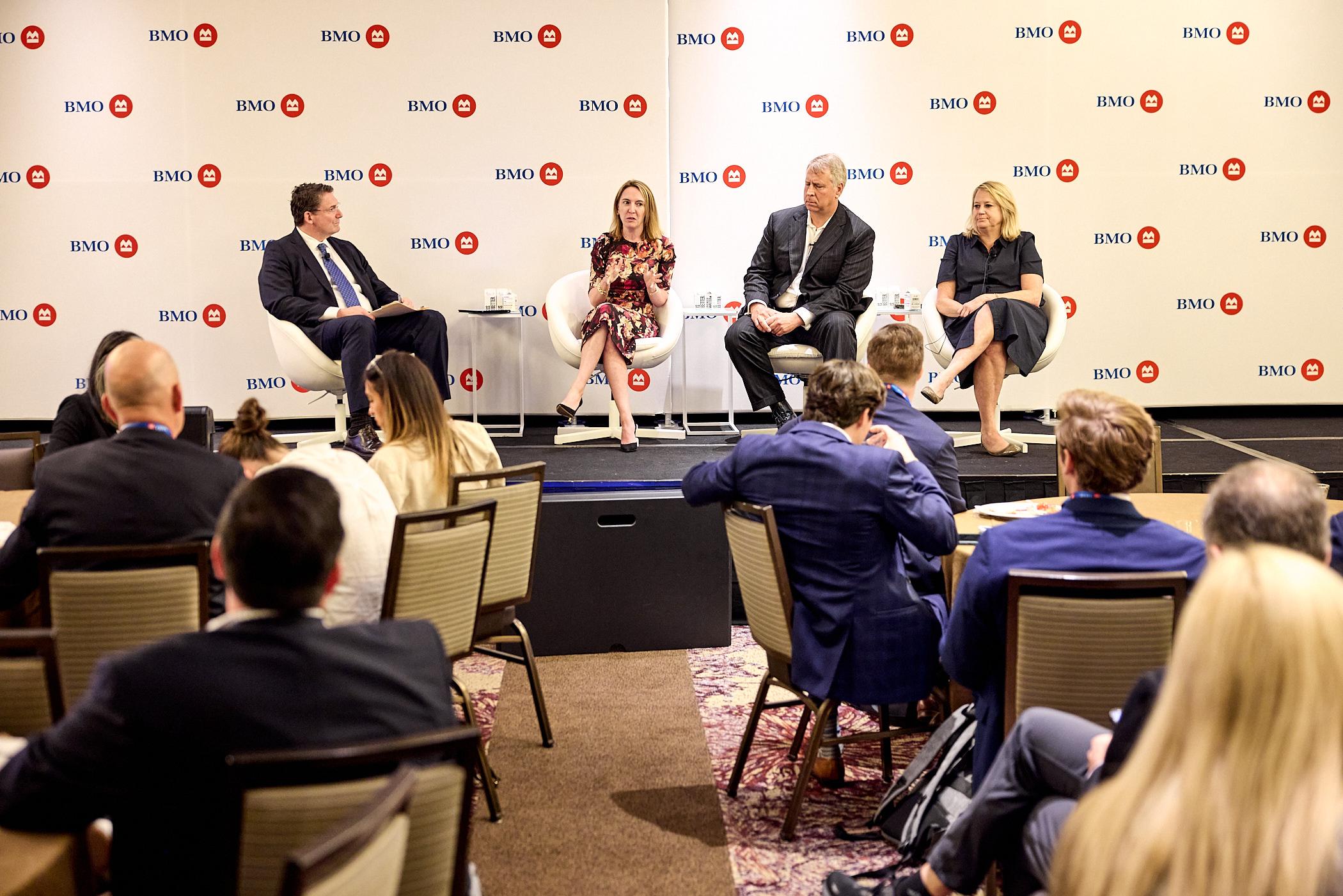Higher interest rates and the current economic outlook are just a few of the factors prompting private equity firms to take a more cautious stance toward the agribusiness sector, but that doesn’t mean the market is at a standstill.
On the contrary, some of the biggest firms in this space report being busy during this stretch – it’s the design of the deals that’s changed. That was the sentiment from the Private Equity Strategies for Navigating Uncertainty keynote panel at our 19th annual Farm to Market | Chemicals Conference in New York.
For a deeper dive into this topic, my colleague Jennifer Kloud, Head of Originations with BMO Sponsor Finance, joined me on stage along with representatives from two leading private equity firms that have a significant presence in the agribusiness industry:
Joanna Reiss, Partner, Co-Head of Impact Investing, Apollo Global Management
Dwight Anderson, Founder, Ospraie Ag Science
As Carrie Cook, Global Head of Investing and Corporate Banking, BMO Capital Markets, outlined in her opening remarks, the panel’s goal was to explore how private equity is maintaining conviction amid considerable economic and geopolitical uncertainty, as well as how investors are approaching deals and mapping out their exit strategies.
Here is a look at some points that stood out during the conversation.
Building conviction
Joanna Reiss leads the Apollo Impact Mission franchise, which focuses on mid-market companies making a demonstrable difference in the world, said that regardless of the market environment, it’s her job to deploy capital. “There is always uncertainty. We’re just trying to take the data that is available, take our cumulative experience and make the best possible decision at that point in time.”
Although the current high cost of capital raises the stakes for finding attractive opportunities, Reiss explained that deals signed during greater periods of uncertainty tend to be pretty good. “You are generally making better decisions, and you’re doing it with eyes wide open for the risks,” she said. Reiss believes we have transitioned from a beta market to an alpha market, which allows investors to create differentiated opportunities, do deeper diligence and ultimately, to outperform.
Like Reiss, Dwight Anderson at Ospraie Ag Science isn’t deterred by what some perceive as a challenging market. In his view, companies should always try and get a deal at a logical price and have faith that management can execute their plans. “We strive to spend as much time as possible thinking about what events could happen,” he said.
The high-interest-rate environment hasn’t created as many challenges as some might have thought, said Jennifer Kloud. An analysis of BMO’s current portfolio shows only a modest change in our fixed-charged coverage ratio – a metric that measures how well a company’s earnings can cover its fixed expenses – from before rates rose to where they are today.
“We view this market as a time that we still can put money out,” said Kloud. “We know what works, what we can put leverage on, and we just continue to stick to what we do.”
Finding exit opportunities
While private equity firms are still finding opportunities to deploy cash, I also wanted to know if they saw the environment in the same positive light when it comes to exiting portfolio companies. Anderson responded by noting that most exits currently in the market are to strategic buyers, as trying to get attractive valuations in public markets is challenging and private equity buyers are very disciplined on price. Much of the inbound interest he’s seen over the past nine months has been from companies facing growth outlook concerns or capital constraints.
Reiss agreed that deals are still happening but taking longer due to increased scrutiny and the higher cost of capital. She emphasized focusing on effective exit planning from the start of an investment by considering how to maximize the value of portfolio companies and different exit options.
The challenge for everyone right now is trying to get the valuations they think their portfolio companies are worth. The process is also taking longer, with many stops and starts along the way. “We always think about the exit when we’re writing the check,” she said.
Still, high-quality companies can demand a premium that, in some cases, can be an even larger multiple than what they might have earned before interest rates rose. Reiss believes that this has a lot to do with the fact that firms are all looking at the same assets. It’s a different experience for lower-quality companies, which can go to market several times, hurting their valuations even more.
Change as a constant
I asked the panel what it means to be a responsible asset owner and how concepts like impact investing and ESG are relevant today. Reiss recentered us on the fundamentals.
Impact investing, she noted, is backing the businesses that are helping underserved populations and the environment through their goods and services. Given the global challenges we face, she believes that companies doing so are secularly advantaged and thus present compelling investment opportunities.
“ESG is about operational factors that are relevant to every single company,” Reiss said. “Many aspects of ESG are simply about making your businesses more successful.” For example, a manufacturer’s safety metrics are a proven indicator of how well its factory is run.
Reflecting on the conversation and the first question, I asked about maintaining conviction, and the panel offered a simple yet important answer: find comfort in uncertainty.
